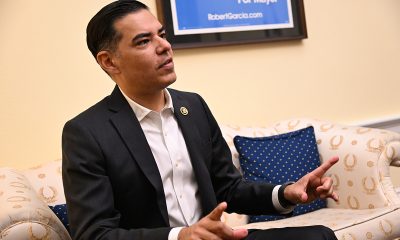COMMENTARY
Treason. Treason. Treason.
An indispensable weapon in our battle to regain democracy

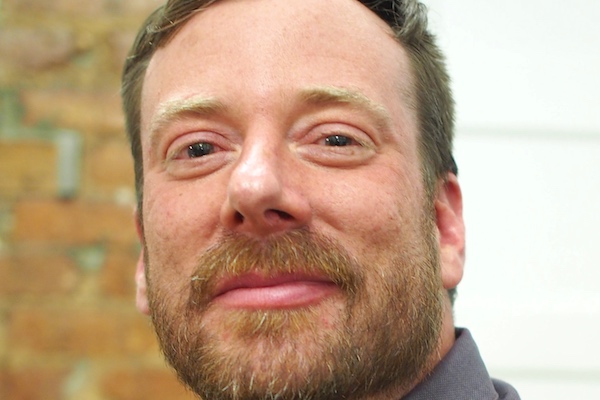
Gabriel S. Hudson, Ph.D., a democratic theorist, teaches at George Mason University’s Graduate School of Education and The Schar School of Policy and Government. He is the author of ‘Christodemocracy and the Alternative Democratic Theory of America’s Christian Right.’ (Photo by Oliver Lawrence)
We live in bizarre times. A democratic norm is violated weekly. Today’s scandal detracts from yesterday’s outrage. Immigrant children are still separated from their parents but we moved on to President Trump insulting our allies in NATO. That horror was eclipsed by the disastrous summit with Russian President Putin in Helsinki. That outrage was crowded out by Trump threatening war with Iran via Twitter and the Environmental Protection Agency threatening to revoke California’s Clean Air Act waiver.
It’s hard to keep up, and it’s even more difficult to effectively counter because we are always absorbing the shock and reacting after the fact.
Now, it looks like the president has provided aid and comfort to an enemy. On foreign soil, Trump openly rebuked the unanimous findings of our intelligence community to defend a hostile foreign power that flagrantly attacked our elections and is continuing disruptions for the November midterms. There’s a term for that and it’s important that we use it: Treason.
The steady stream of news reporting suggests the President is in real legal jeopardy. Though we cannot know exactly what conclusions Special Counsel Robert Mueller will reach in his investigation into Russia’s interference in the 2016 elections, we can predict with near certitude that about half the country will reject his findings outright, regardless of the strength of the evidence. We know there is a battle coming and we need to be strategically preemptive in our messaging.
Often a political loss can teach us about strategy. I remember watching election results in 2008. Everyone cheered watching Barack Obama’s presidential victory. I also remember anxiously watching the results for Prop 8—the initiative that stripped away same-sex marriage rights in California.
After we stopped reeling, we picked through the Prop 8 rubble to look at what had gone wrong. Political consultant Frank Shubert, who successfully led the ProtectMarriage.com campaign, built out from their anti-gay religious base to project a fear of what might happen if same-sex marriage remained law. Brian Brown, President of the National Organization for Marriage, pounded that message daily, regardless of how many facts and figures and experts said they were wrong and lying.
The lesson of the Prop 8 battle was to get ahead of the adversary’s messaging. Don’t merely respond; direct the debate.
Democrats are now debating whether to even discuss impeachment. Only two presidents have been impeached, Andrew Johnson and Bill Clinton, but they were both acquitted by the Senate. Richard M. Nixon resigned before the House could vote. Despite presidential incompetency and criminal behavior, impeachment has generally been considered a bridge too far. Now it’s not far enough.
Both the Constitution and Title 18 of the U.S. Code provide a vague characterization of the term “treason” without precise criteria for what counts as treason. But both have strong antecedents in law and constitutional interpretation, if treason wasn’t automatically off the table in “what if” debates.
Here, NOM’s Brian Brown may inadvertently be useful. Brown now also heads the World Congress of Families, part of a wave of U.S. evangelical leaders, including Trump friend Franklin Graham, who laud Putin and Russia for their anti-gay laws. Gay Republican Fred Karger, a former GOP presidential contender, contends that Brown’s activism against LGBTQ people before the Russia Duma and in concert with Russian officials may have violated the Logan Act, a federal law that prohibits unauthorized citizens from collaborating with foreign governments. No one cared. But now there are questions about whether Trump’s most adamant supporters violated the Logan Act by collaborating with Russia to ultimately benefit Trump, if not at his behest. Was their secret collaboration with a hostile foreign power treasonous?
At some point, the Supreme Court will likely weigh in on the Russian investigation. With a conservative majority nearly certain, it is essential that we develop a plain-text, originalist, Scalia-esque interpretation of the Constitution to prepare for battle. The wording of Article 2, Sect. 4 provides that opportunity: “The President, Vice President and all civil Officers of the United States, shall be removed from Office on Impeachment for, and Conviction of, Treason, Bribery, or other high Crimes and Misdemeanors.”
It is the precise wording and punctuation that is important for Constitutional interpretation. The use of a singular “Conviction” of Treason—separated by commas—suggests that only the President needs to be convicted to remove his Vice President and Cabinet officers. If Trump is convicted of Treason specifically, a plain text reading of the Constitution strongly suggests the entire crew goes. That also means no President Pence.
Even if whipping out the entire administration with one conviction is pure fantasy, pushing for that fantasy is strategically smart. By loudly advocating for elimination of Trump, Pence and the cabinet, merely impeaching the President sounds like a compromise. Hammering the charge of Treason best positions progressives to utilize and maximize Mueller’s findings.
It may be a pipe dream to remove the entire team. We have to be proactive; we cannot afford to keep reacting. Treason’s unique usage in the Constitution makes it an indispensable weapon in our battle to regain democracy. We should start using it now.
You would not be alone. Former CIA Director John Brennan called Trump’s performance next to Putin “treasonous.” “Donald Trump’s press conference performance in Helsinki rises to & exceeds the threshold of ‘high crimes & misdemeanors.’ It was nothing short of treasonous,” Brennan tweeted during the event. “Not only were Trump’s comments imbecilic, he is wholly in the pocket of Putin. Republican Patriots: Where are you???”
Commentary
The Supreme Court’s ‘Don’t Read Gay’ ruling
Lane Igoudin, a gay Dad, writer, and educator, gives his perspective

The recent U.S. Supreme Court Mahmoud v. Taylor decision gives parents the green light to remove their children from the school curriculum that includes books with LGBTQ themes and characters. This court ruling is a troubling step backwards, using religion to enshrine homophobia.
First the facts. In 2022, a Maryland school district added to its elementary curriculum nine LGBTQ+-inclusive picture books like Intersection Allies by Chelsea Johnson, and Pride Puppy by Robin Stevenson, and Prince & Knight by Daniel Haack. These books, according to the district’s communications director, tell “joyful stories of folks who happen to be part of the LGBTQ+ community” and “celebrate and positively portray LGBTQ+ identities.”
The following year, facing the growing number of parents’ opt out requests, the district withdrew its opt-out waiver policy because it was causing significant disruptions to the schools’ learning environment.
Three sets of religious parents (Muslim, Catholic, and Eastern Orthodox) represented by Becket Fund for Religious Liberty, a legal group with an anti-LGBTQ history, sued the district for the right to opt out, claiming that the district infringed on their religious rights.
What religious rights one might ask? At the heart of the matter is the question whether public schools can require children to participate in instruction on gender and sexuality which contradicts their parents’ religious beliefs.
On June 27, 2025, the Supreme Court sided 6-3 with the plaintiffs, with the dissenting votes coming from Justices Jackson, Kagan, and Sotomayor.
The majority opinion cited two precedents addressing religious beliefs in public schools (Barnette and Yoder): in one, Jehovah’s Witness students were allowed not to salute the American flag and the other protected Amish children from educational environments hostile to their beliefs.
If the connection between those cases and inclusive picture books seems tenuous, one should simply read the 135-page court ruling and be transported back in time.
“The[se] books are unmistakably normative. They are designed to present certain values and beliefs as things to be celebrated,” the decision explains. Citing, for example, the inclusive message in the books about same-sex marriage such as Uncle Bobby’s Wedding by Sarah Brannen, the court states that “many Americans advocate with utmost, sincere conviction that, by divine precepts, same-sex marriage should not be condoned” (Mahmoud v. Taylor, p. 3).
This assumption, however, contradicts the recent, 2024 Gallup Poll which found that more than two in three Americans (69%) support same-sex marriage. Many of them believe in God. Many of them are also parents.
The court’s conservative majority finds it objectionable that these books “present the opposite viewpoint to young, impressionable children who are likely to accept without question any moral messages conveyed by their teacher’s instruction. The storybooks present same-sex weddings as occasions for great celebration and suggest that the only rubric for determining whether a marriage is acceptable is whether the individuals concerned ‘love each other’.”
The books’ inclusive, normalizing message on sex and gender is also subject to the court’s ire. “Many Americans, like the parents in this case, believe that biological sex reflects divine creation, that sex and gender are inseparable, and that children should be encouraged to accept their sex and to live accordingly. The storybooks, however, suggest that it is hurtful, and perhaps even hateful, to hold the view that gender is inextricably bound with biological sex.”
And the commentary goes on.
It is shocking that in 2025, after decades of struggle for acceptance and equality and the deep change in the cultural norms and values, such anti-LGBTQ rhetoric would still hold sway.
And it is frightening that as in decades past, the court would pit faith and parenting against the LGBTQ+ community, as if they are mutually exclusive, as if the LGBTQ community does not raise children, as if most families of faith in the society at large would want to withhold the books that accept and affirm from their children.
That simply isn’t so. Many religious denominations today support LGBTQ rights and welcome our families and our children. My husband and I, for instance, raised our two daughters in the Jewish tradition, and not once did we have to hide or change who we were.
“What can I do to bring you here?” asked me the rabbi of the local Conservative Jewish temple when we first moved into our neighborhood. That was 20 years ago, and it hasn’t changed.
We raised our kids with a deep sense of acceptance and tolerance, and much of it came from the teachings of faith. Similarly, our kids’ public schools were affirming of LGBTQ+ students. For some of these students, public school was their safe place, away from the intolerance and rejection they experienced at home. If children cannot learn about tolerance and inclusion at school, where else can they learn it?
Ultimately, it’s not about religious rights. It’s about the right to raise children in a world in which LGBTQ people do not exist. Acceptance and inclusion would contradict this homophobic worldview, and that’s what these parents – and the Supreme Court – do not want.
Lane Igoudin, Ph.D., is the author of A Family, Maybe, a gay father’s adoptive journey included in the Mombian Database of LGBTQ Family Books. He is a professor of English/ESL at Los Angeles City College and a past Andrew W. Mellon Fellow with UCLA Humanities.
COMMENTARY
What if doctors could deny you insulin for being gay?
The Supreme Court just made that legal for trans kids

Imagine walking into a pharmacy, prescription in hand, and being told, “Sorry, we don’t give that to people like you.” Now imagine the government says that’s perfectly fine—as long as it’s wrapped in words like “concern” or “safety.”
That’s not a dystopian movie plot. That’s United States v. Skrmetti.
On June 18, the U.S. Supreme Court upheld Tennessee’s SB1, a state law that bans gender-affirming care for minors. Puberty blockers. Hormone therapy. All of it. Not because the treatments are dangerous (they’re not), or untested (they’re not), but because the kids receiving them are transgender.
Let’s be clear: this isn’t regulation. It’s targeted denial. And it just got the Supreme Court’s stamp of approval.
Chief Justice John Roberts, writing for the majority, said SB1 doesn’t discriminate. He argued the law merely regulates treatment based on “age and purpose.” That’s a little like banning seatbelts—but only for gay people—and claiming it’s about “safety.” Here’s the truth: SB1 bans hormone therapy only when it’s used for gender transition. Those same drugs are still allowed for other conditions. That’s not neutral. That’s surgical discrimination, written into law.
Even Tennessee’s legal team admitted it: the law “only affects those who seek to transition.” That’s not an accidental loophole. That’s the entire point.
Even worse, the Court ducked the bigger question: Do transgender Americans qualify as a “suspect class” under the Constitution—meaning they deserve stronger protections against discrimination?
Historically, groups with a long track record of discrimination, limited political power, and immutable traits (like race or religion) have gotten this status. Trans people check every box. Yet the Court said nothing.
That silence wasn’t a technicality. It was a political decision. A willful refusal to say: “You matter. You count. You’re protected here.”
Let’s drop the pretense. This isn’t about medicine or morality. Gender-affirming care is backed by every major U.S. medical association—from the American Academy of Pediatrics to the AMA. It’s safe. It’s effective. And it saves lives.
But these laws don’t ban puberty blockers across the board. They just ban them for trans kids.
That’s not policy—it’s punishment.
We wouldn’t tolerate a law that banned mammograms for women, or insulin for diabetics, only if they’re queer. But that’s exactly what this is: identity-based medical apartheid.
Supporters claim it’s about protecting children. But you don’t protect kids by denying them care recommended by doctors and supported by science. You do that to control who they’re allowed to become.
Here’s the part that should make us all pause: Most Americans don’t agree with this decision. A recent Pew poll found that 64% of Americans support protections for transgender people. Nearly 60% support access to gender-affirming care. Among young adults, those numbers are even higher.
This isn’t a red state vs. blue state issue. It’s a basic civil rights question in the 21st century. The people are not divided. But our institutions—the courts, the legislatures—are lagging behind. Or worse, being weaponized.
This ruling leaves trans youth legally exposed and politically abandoned. But that doesn’t mean we’re powerless.
Here’s what must happen now:
· State legislatures must pass ironclad non-discrimination laws that protect transgender youth where federal protections now fall short.
· Congress must pass the Equality Act—in full—and enshrine civil rights protections for LGBTQ+ Americans nationwide.
· The media must stop framing this as just another “culture war.” This isn’t about ideology. It’s about constitutional rights—access to care, bodily autonomy, and equal protection under the law.
· And we the people must act. Vote. Call your lawmakers. Tell your stories. Make it clear that civil rights don’t depend on your zip code, political party, or gender identity.
This moment is more than a court ruling. It’s a moral test for a country that claims to believe in liberty and justice for all.
You don’t have to be trans to be alarmed. If the state can deny medical care to one group based on identity, what’s to stop them from doing it to you? Your kid? Your neighbor?
History will remember where we stood. Let it remember this: we stood with trans kids and their parents. Loudly. Unapologetically. And without retreat.
James Bridgeforth, Ph.D., is a national columnist on the intersection of politics, morality, and civil rights. His work regularly appears in The Chicago Defender and The Black Wall Street Times.
Opinions
The psychology of a queer Trump supporter: Navigating identity, ideology, and internal conflict
An exploration of how internalized stigma, psychological conflict, and socio-political pressure can lead some LGBTQ+ individuals to support figures and policies that challenge their own place in society.

Earlier this week I was having lunch with my friend and neighbor at our deliciously default pasta spot where everybody knows your name and, as always, were shooting the breeze with the co-owner-slash-manager, whose warmth and wit is never 86’d and, in conjunction with our lust of carbs, always keeps us coming back.
For the first time, we lightly breached the topic of politics. I know, I know, waters best left uncharted more often than not. Anyhow, his expression shifted from usual light-hearted charm to something more strained, notes of discomfort and chagrin. In response to our hesitance and likely cautious stares, he revealed that his husband – who also happens to be our server that day (yes, they work together, which is adorable, but not the point) – is a supporter of President Trump. That revelation, he admitted, has created serious tension in their relationship.
This paradoxical information got my cogs turning in my mind – what is occurring in the mind of a queer-identifying person who favors such a political figure as our current president?
In this unkempt landscape of American politics, the alignment of LGBTQ+ folks with what are seen collectively as conservative ideologies, particularly open or not so open support for figures like President Trump presents quite the complex and often misunderstood phenomenon. This intersection of queer identity and conservative politics challenges conventional narratives and invites a deeper exploration into the psychological, social, and cultural factors that fuel such political affiliations.
Most find it a cognitive strain to comprehend such a contradiction. At first look, the support of LGBTQ+ folks for a person and figure like our current president comes across as self-loathing and straight-up-gay-up backwards. The Trump administration was marked by policies that many perceive as a blow to LGBTQ+ rights, including attempts to ban transgender folks from military service and the rollback of protections against discrimination in healthcare. Despite all of this, a surprisingly large number of the LGBTQ+ community expressed support for him/it/what-the-f*ck. Understanding this mentality requires a closer look at the psychological mechanisms at play.
One undeniable factor is the concept of system justification theory, which tells us that people can be and often are motivated to defend and rationalize the status quo, even when it may not align with their best interests. For some queer folks, aligning with conservative ideologies may serve as a means to gain acceptance in broader societal structures that value traditional norms and values. This alignment can provide a sense (a sense) of belonging and validation, even at the cost of personal identity and community solidarity.
Another, arguably obvious, key factor to consider is the presence of internalized homophobia, where queer folks internalize societal prejudices that are against their own identity and best interest. Research has shown that approximately 4 out of 10 gay Republicans view their homosexuality as a personal shortcoming and would prefer to be straight if given the chance. This internalized stigma can lead to a disconnection from the whole LGBTQ+ community and a preference for political ideologies that align with traditional values, even if those ideologies are not supportive of (their own) LGBTQ+ rights.
This internal conflict is even more complicated by the yearning to conform to societal expectations of traditional and arguably toxic masculinity. The concept of precarious manhood hints that some men feel the pressure to adhere to more traditional masculine norms to avoid being perceived as weak, lesser than, or effeminate. For some queer cismen, supporting conservative figures who embody these traditional masculine ideals is a way to assert their masculinity and gain societal acceptance, even if it means distancing themselves from their queer peers and identity.
Trauma also plays an often overlooked role in shaping political identity – especially for queer folks. For some, early experiences of rejection, bullying, shame-inducing religious influence, or even familial abandonment may create deep psychological and emotional wounds that, gone unaddressed, never fully heal. Rather than seeking solace in queer spaces and groups that tend to be affirming, those with unresolved trauma may seek safety in systems that appear more rigid or authoritative – even when those systems have historically marginalized them. Supporting a figure like Trump, who attempts to project strength, dominance, and control, can feel like a form of self-protection or even empowerment. It’s a way of aligning with power rather than vulnerability, even if that power has been used to harm people like themselves. In this sense, political support can become not just ideological, but emotional, acting as an unconscious attempt to rewrite personal narratives of victimhood by choosing the “winning” side.
Looking past identity and other psychological factors, practical considerations also play their part in political affiliation. Economic policies championed by conservative figures, like tax cuts, deregulation, and a free-market approach, appeal to LGBTQ+ folks who tend to prioritize financial independence and personal perception of responsibility. For those who value financial independence and personal responsibility, these ideas can feel like a better fit than the social policies typically supported by more liberal politicians.
The phenomenon of queer folks supporting conservative figures like Trump serves as an indication to the intricacies of human identity and political affiliation. It challenges simpler narratives and necessitates a more nuanced look into the factors that influence our political choices.
Rather than simply casting, it’s worth one’s while to critically consider the underlying factors that shape political beliefs – especially when those beliefs seem to run counter to the interests of marginalized communities that they are (whether they like it or not) a member of. Psychological distress, unresolved trauma, internalized stigma, and a longing for some semblance of acceptance can all impact one’s political alignment in ways that aren’t always rational or self-preserving. Acknowledging the complexities of these influences can give way for a clearer view into how some queer people are drawn like mosquitos into a bright light toward ideologies or figures that undermine their rights. Understanding these dynamics is not a matter of justification but of clarity. Only through that clarity can we begin to appropriately and efficiently address the deeper forces at play in our collective political consciousness.
And the pasta was just okay that day.
COMMENTARY
USAID’s demise: America’s global betrayal of trust
Trump dismantled agency, undermining LGBTQ people everywhere

The U.S. Agency for International Development — proudly my institutional home for several years of my international development career and an American institutional global fixture since November 1961 — is no more.
How will USAID’s closure impact LGBTQI+ people around the world, especially in poor, struggling countries (“the Global South”)? Time will tell, but “dire,” “appalling,” and “shameful” are appropriate adjectives, given the massive increase in HIV/AIDS deaths that follow the callous, abrupt, and unspeakably cruel cut-off of funding for USAID’s health and humanitarian programming in HIV/AIDS prevention, treatment, and care.
Regarding LGBTQI+ people and issues, USAID worked in a tough neighborhood. In Africa alone, more than 30 countries in which USAID had programming still criminalize same-sex relationships, often to the point of imposing the death penalty. These fiercely anti-LGBTQI+ countries share harsh anti-LGBTQI+ punishments with most countries in the Middle East and North Africa. Other countries where USAID formerly worked retain colonial-era sodomy laws.
Where did USAID fit into all this turbulence? The agency was not allowed to transgress local laws, so how could it support the human rights of local LGBTQI+ people? USAID did so by building close and trusting relationships with local LGBTQI+ civil society, and by “superpower advocacy” for the universal human rights of all people, including those of us in the queer community.
I served at USAID’s Africa Bureau under the Obama administration, becoming the only openly transgender political appointee in USAID’s history. In that role, I was privileged to have a platform that caught the astounded attention of both queer people and of anti-LGBTQI+ governments around the world. If the president of the United States can elevate a transgender woman to such a senior position within the U.S. government, that open declaration of acceptance, inclusion, worth, and recognition set a precedent that many in the LGBTQI+ community worldwide hoped their countries would emulate.
Serving as an openly queer person at USAID also afforded me the opportunity to meet with many fiercely anti-LGBTQI+ senior politicians and government officials from African countries who sought USAID funding. Uganda’s first woman speaker of the parliament, Rebecca Alitwala Kadaga and her whole delegation came to see me at USAID in Washington about such funding. I had some very frank (and USAID-approved) “talking points” to share with her and her team about President Obama’s strong and secular commitment to equal human rights for all people. My tense meeting with her was also an opportunity to educate her as to the nature of the transgender, nonbinary, and intersex community — we who are simply classified and discriminated against as “gay” people in Uganda and in most countries in the Global South. I also had the chance to represent USAID in the “inter-agency” LGBTQI+ human rights task team led by gay U.S. Ambassador David Pressman, whose effective leadership of that Obama-era initiative was inspirational.
Working closely with professional, capable, and caring USAID career employees such as Ajit Joshi and Anthony Cotton, and with the strong and open support of the USAID Deputy Administrator Don Steinberg, I helped to craft and promote USAID’s very first LGBTQI+ policy. Under President Obama, USAID also created the LGBT Global Development Partnership, a public-private partnership supporting LGBTQI+ civil society groups throughout the Global South. USAID funding also increased for programs promoting LGBTQI+ inclusion, anti-violence, and relevant human rights protections. This programming expanded further (albeit never adequately funded) during the Biden administration under the able leadership of USAID Senior LGBTQI+ Coordinator Jay Gilliam and his team.
So what did it all mean? Has USAID left a footprint for the global LGBTQI+ community? Will its absence matter?
In my view, that answer is an emphatic yes. International development and humanitarian response go to the heart of recognizing, respecting, and caring about universal human dignity. USAID converted those ethical commitments into tangible and meaningful action, again and again, and modelled for the world what it means to truly include all persons.
My time serving at USAID was a high point of my career, being surrounded by the best of American civil servants and foreign service officers. For me, “USAID Forever” remains my battle cry. Let’s start thinking of how we will rebuild it, beginning in three years.
Chloe Schwenke is a professor at Georgetown University’s McCourt School of Public Policy.
Commentary
Breaking the mental health mold with Ketamine: insights from creator of Better U
How this brand is making high-impact mental health care available to the people who need it most

Ketamine therapy was once on the fringe, but now makes up a fast-growing field in the world of Mental Health. Derek Du Chesne of Better U, a mental health service in West Hollywood, shares how his team attempts to make psychedelic care safer, smarter and more accessible.
Mental health is finally getting the attention it deserves and as our understanding of it deepens, so does the range of tools available to support it. In recent years, psychedelic-assisted treatments like ketamine are gaining serious ground and a growing number of clinicians have turned to these as promising alternatives to more traditional methods. Enter Du Chesne, creator of Better U, with the goal of making ketamine therapy more accessible and personal. In our conversation, Du Chesne shares the mission behind Better U, the challenges faced by underserved communities and how his team is aiming to reshape the mental health landscape one patient at a time.
Can you share what Better U is all about?
I’m the founder and CEO of Better U. We’re a telemedicine-based alternative wellness platform, currently operating in 35 states. We primarily offer ketamine therapy for conditions like depression, anxiety, PTSD and suicidal ideation. We also provide services in sexual health, clinical weight loss and holistic psychiatry.
You’ve had your own experience with psychedelic therapy. Can you talk about how that journey inspired Better U?
Six years ago, I never imagined I’d be doing this. I had used psychedelics recreationally, but ketamine never interested me. I saw it as a horse tranquilizer nothing I’d ever take seriously.
I had been working in alternative health, specifically cannabinoids mainly on the supply chain side across several industries. In 2019, I traveled to about 40 countries for work and we raised around $40 million in capital. That year, my company made $85 million in revenue and was heading into a $1.2 billion acquisition. Personally, I was also about to get married. Within six weeks, both my career and my relationship unraveled. The company let me go just before my equity vested and I later found out my fiancée had been unfaithful while I was on the road.
Everything I had built my identity around collapsed. I spiraled into a deep depression, tried therapy, psychiatry, and antidepressants. None of it helped. Eventually, I became suicidal. A close friend intervened and brought me to a ketamine clinic. I was extremely skeptical, especially since a single session cost $1,600. But about 15 minutes into it, I felt like I could breathe again for the first time in months.
The treatment helped me separate from the constant, negative thought loops. It created space between me and my pain, helping me see that the things that happened didn’t define me. That clarity changed everything. I no longer felt like I had to carry shame or blame for what others had done. It gave me peace.
Shortly after, a friend suggested I get out of my environment. Everything in my home reminded me of the past. I went to The Bahamas for a reset: sun, exercise and healing. That period helped me recalibrate.
Months later, I was invited to Stanford by a friend whose sister leads epidemiology there. At dinner, I met someone involved in psychedelic research. I shared my experience and he invited me to visit their depression clinic and psychedelic research lab. That’s when I realized the transformative potential of these therapies. I sat with hospice patients receiving psychedelic treatments. People from all walks of life have similar, profound responses. It was incredibly moving.
That’s when I started thinking: how do we make this affordable and accessible? My first ketamine session was powerful, but afterward, there was no follow-up, just a “see you next week.” It felt transactional. I wanted to build something more thoughtful, especially for people like those in my small hometown in Wisconsin where mental health care is rare and stigma is high.
Better U was born from that idea.
Better U has facilitated over 230,000 sessions for around 18,000 patients nationwide. A large portion of your clients identify as LGBTQ. Why do you think ketamine therapy resonates so deeply with that community?
The LGBTQ community is incredibly diverse, and so are the challenges its members face, from gender dysphoria and identity struggles to rejection from family, friends, or society. That rejection often comes right at the moment someone begins living as their authentic self. The emotional toll can be devastating and in many cases, the suicide rates, especially among trans individuals, are alarmingly high.
Ketamine therapy creates space. It allows someone to step outside of the emotional chaos, the shame, fear, judgment and look at themselves without that mental noise. When you can separate your identity from the voices in your head or the reactions of others, there’s clarity. You begin to realize, “This pain isn’t about who I am, it’s about others’ inability to accept me.” That shift can be life-saving.
Many of our LGBTQ clients come to us after years of self-medicating with alcohol, drugs, or even unhealthy relationships. Others feel like they’ve hit a wall with traditional talk therapy. As we age, our brains get more set in their patterns. Ketamine disrupts those patterns. It can help people access a deeper level of understanding and healing, especially when other methods have stalled.
What’s powerful is that many patients don’t come in intending to stop drinking or using substances. They come for anxiety, depression, or suicidal thoughts. But after a few sessions, they’ll say, “I realize my drinking is tied to social anxiety,” or “I use because I feel like I have to numb myself to be accepted.” The therapy helps them see that those coping mechanisms aren’t serving them anymore.
We’re based in West Hollywood, so we’re deeply embedded in this community. In cases of suicide attempts, local hospitals like Cedars-Sinai often reach out to us because ketamine has become one of the most effective tools for treating suicidal ideation.
That said, it’s not a cure-all. If someone is abusing ketamine recreationally, we won’t treat them with it. It’s not safe or appropriate. But in a clinical setting, when properly dosed and supported with integration care, we’ve seen almost no cases of addiction. It can be a powerful tool for healing when used with intention.
Trauma-informed care is a term that gets used a lot in mental health these days, but what does it actually mean to you and how do you apply that framework at Better U?
To me, trauma-informed care means creating a system where every person interacting with a patient, from intake to integration, is trained to recognize, respect and respond to trauma. At Better U, we’ve built multiple layers of support to reflect that. While our welcome team handles basic screenings and eligibility, it’s our clinicians, integration therapists and success team who are most deeply trained in trauma-informed practices.
The unfortunate reality is that many ketamine clinics are founded by anesthesiologists—people who understand how to use the drug medically, but have little or no training in mental health. You can see it when you look at their teams: no psychotherapists, no psychiatrists, no trauma-informed staff. That’s dangerous, especially with a treatment that has the potential to surface deeply emotional material.
At Better U, we made sure to embed trauma-informed care into our clinical culture. Our doctors like Dr. Zaa Faul—a dual-board-certified addiction specialist and Army veteran—and Dr. Jamie Brooks, have deep expertise in both mental and physical health. Our success team, which supports patients after their sessions, is mostly made up of licensed therapists and professionals with years of experience in crisis care, psychedelic research and emotional integration.
Trauma-informed care also means learning how to hold space for people in distress. When I was the only person speaking to patients in our early days, I got yelled at, cussed out, blamed, not because patients were “bad” people, but because they were in pain. Maybe they hadn’t slept, or fasted before a session and were feeling raw. Maybe they were grieving or reliving trauma. You have to meet people where they are, understand that it’s not personal, and guide them toward healing without judgment. That’s where nonviolent communication becomes essential too. It’s a big part of how we train our staff.
Ultimately, it’s not just about delivering a treatment. It’s about helping people feel seen and safe enough to transform. And when you do that well, you get to witness incredible things, like someone processing deep grief or suicidal thoughts in a matter of weeks, instead of years. That’s the beauty of this work.
Let’s say I’m a potential patient who’s hesitant of undergoing ketamine therapy. What would you say to ease my mind?
Sure. First, I’d ask, have you ever had any experience with psychedelics?
[Then, I’d explain] most people who come to Better U, probably over 95%, have never had any experience with psychedelics. So it’s completely normal to feel anxious going into a first session and entering an altered state of consciousness. Especially if it’s unfamiliar.
I want to be transparent—our program isn’t a microdose. It’s a full, immersive experience.
That said, let me walk you through what the process actually looks like so you know what to expect.
After a consultation with a doctor to make sure this is a safe and appropriate treatment for you, you’ll receive a kit in the mail. That includes a blood pressure cuff, a journal, a “brain box,” and other tools to support your experience.
Then, before your first session, you’ll have a mandatory preparation meeting with one of our therapists. That’s where you can ask any remaining questions or talk through any lingering anxiety. You can even request a group session if you want to hear what others are feeling.
We also start very slowly. Your first dose is intentionally low — it won’t feel like a full psychedelic trip. It’ll feel more like a medication-enhanced meditation. It’s really just a way to help you dip your toe in and see how your body and mind respond before we increase the dose.
Is it safe?
Yes, incredibly safe, when done properly. Our protocols are built to prioritize your safety at every step. We’ve worked with thousands of patients and have seen incredibly low rates of any negative outcomes, especially when compared to traditional psychiatric medications.
And to be direct, while this work can be uncomfortable at times, it’s not always sunshine and rainbows, it’s also where the breakthroughs happen. This treatment acts like a mirror, helping you see what’s going on inside, but from a different, often clearer, perspective. And sometimes just that shift in perspective can change everything, from how you relate to yourself to how you engage with the world around you.
Where do you see Better U going in the near future, and how do you see it shaping the future of mental health?
Right now, one of our primary focuses is on insurance credentialing for all of our providers. Most of our patients come to us already on medications – antidepressants, benzodiazepines, Adderall, and so on—and as things currently stand, we can’t legally give them a plan to taper off or discontinue those medications.
So, let’s say someone goes through eight ketamine sessions with us and feels amazing, but they’re still on Xanax or an SSRI—we can’t formally help them get off of it. I think a huge issue in the U.S. right now is over-diagnosis and over-prescription. So by getting our doctors credentialed to accept insurance, including Medicare and Medicaid, we can create six month plans.
For example, to help patients reduce or discontinue medications that may no longer be serving them. At the very least, we want to help people lower their dosages to give themselves a fighting chance. Because right now, mental health care in this country is incredibly broken.
We’re also implementing AI. We’re about to launch a 24/7 companion app that provides continuous support. I think one of the reasons Alcoholics Anonymous has been so successful is the sponsor model. We’re building something similar: an AI “sponsor” or companion that can provide round-the-clock mental health and physical wellness support. Think of it as an AI therapist that works alongside the human element.
Looking further ahead, we’re also preparing for the future of MDMA-assisted therapy, psilocybin and other emerging treatments. There’s a lot coming and we’re positioning Better U to be at the forefront of it all.
Viewpoint
I’m a queer Iranian Jew. Why I stand with Israel during this conflict
‘Hands Off Iran’ movement is erasure, not solidarity

The sirens cut through the night, jolting me from sleep. My heart pounds as I lie in bed, listening to the explosions outside. I don’t have to run — my Airbnb bedroom is a “mamad,” a reinforced bomb shelter built into the apartment. Though the windows are sealed, I can feel the building shake with each blast. This is my reality now.
I arrived in Tel Aviv just before the escalation with a delegation of North American LGBTQ leaders. We came to stand in solidarity with Israel’s LGBTQ community, which has increasingly been isolated by the global queer movement. After the delegation’s five-day mission, I had planned to stay an extra week. But on my first night here, the war broke out.
Despite the fear and chaos, I’m proud to be here. While I’m not a permanent resident of Israel — I live in Los Angeles, home to the largest Iranian Jewish community in the U.S. — I feel like I’m exactly where I’m meant to be. I work in both Iranian and Jewish advocacy spaces, and being here during this pivotal moment is an act of presence, of witness, and of resistance.
The adrenaline of seeing Israel strike back against the IRGC gave way to the sobering realization: I am in a war zone. But I know I’m safer here than I would be in many other places — because Israel protects its people. With shelters. With missile interceptors. With warnings. With a government that values civilian life.
In Iran, people don’t have that. The regime in Iran — and I use that term deliberately, because the regime is not the people — cut off internet access to prevent civilians from receiving IDF warnings before strikes. They wanted maximum casualties. They wanted suffering. They wanted images to manipulate. The same regime that imprisons, tortures, and executes LGBTQ people. The same regime that stripped my family, and millions of others, of their home.
So, when I heard the same anti-Israel activists who have spent the past 20 months calling to “globalize the Intifada” — a clear genocidal chant — adopt the new catchphrase “Hands Off Iran,” my heart sank. This is not solidarity — it’s erasure. These people defend the very regime that forced my parents to flee, tearing our family apart.
Romanticizing the Iranian regime with protest signs and slogans isn’t just tone-deaf. It’s prioritizing aesthetics over truth, trend over substance, and optics over people. It’s especially painful when I see it coming from my LGBTQ peers.
Growing up queer in the Iranian Jewish community during the ’80s and ’90s wasn’t easy. It was LGBTQ spaces that taught me how to stand tall in my truth — how to live authentically and reject shame. But now, those same spaces often turn their backs on me because I’m a Zionist, a widely misunderstood movement which simply calls for Jewish self-determination.
The hypocrisy of the current anti-Israel rhetoric is glaring. The “Hands Off Iran” movement is misguided, providing cover for a regime that tortures its citizens. Yet these activists were nowhere to be found during critical moments like the 2022 “Woman, Life, Freedom” uprisings, when Iranian women risked their lives burning their hijabs in protest. After Mahsa Amini was murdered simply for showing a little hair, those cheering “queers for Palestine” said nothing. This silence in the face of tyranny is not progressive — it’s dangerous.
For me, this conflict is not theoretical — it’s personal. I’ve witnessed firsthand how the Iranian regime targets LGBTQ people, religious minorities, and women. In Israel, I’m free to be who I am — a queer Iranian Jew. If we fail to stand with Israel, we fail to protect the values of freedom, human rights, and dignity. Israel is more than just a country — it’s a refuge for people like me, and it must remain that way.
As I write this, a fragile ceasefire is in place. But even with the quiet, the clarity remains. Israel is more than just a nation. It’s a refuge. And it’s worth standing up for — not because it’s flawless, but because it’s real. And because without it, people like me — queer, Iranian, Jewish — would have nowhere to turn.
Matthew Nouriel is a digital producer at the Tel Aviv Institute, Community Engagement Director at JIMENA, and a queer Iranian Jewish activist. He lives in Los Angeles.
Opinions
Pride and Protests: A weekend full of division
Amid more upcoming raids and protests, we will have to learn when to act, how to react and when to find pockets of joy to celebrate in, because those moments are also acts of resistance
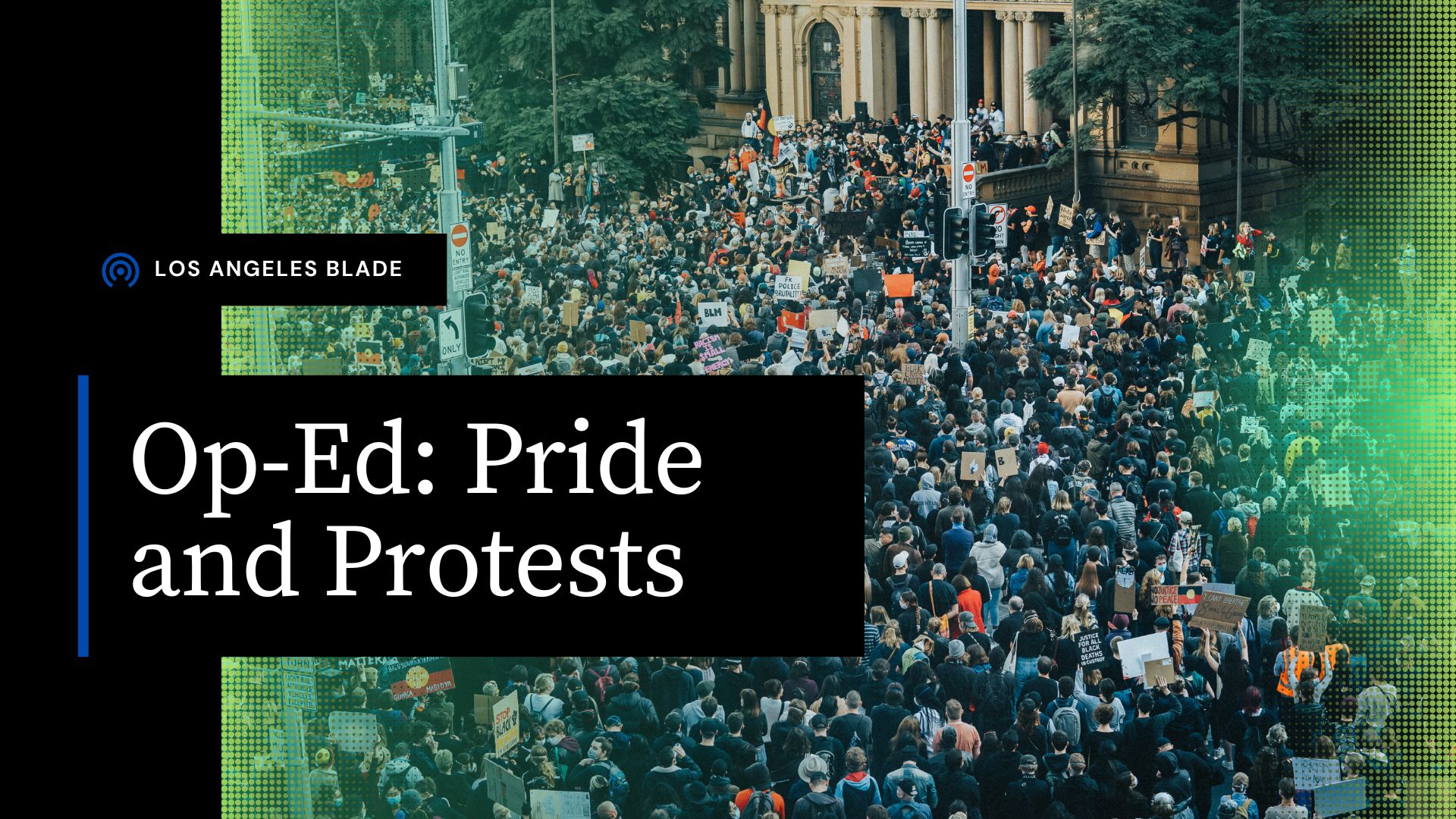
While many Angelenos celebrated the 55th annual L.A. Pride and mainstream news outlets like ABC7 and FOX11 news covered the celebrations, the reality for many other Angelenos involved tear gas, rubber bullets and breaking news coverage from community-led outlets like CALÓ News.
If we were to take a step back into the history of Pride, we would be angered by the amount of violence and pain that led to the protests on the dawn of June 28, 1969. The Stonewall uprising took place as a result of police raids at the now-infamous Stonewall Inn on Christopher Street in New York City. The night that has gone down in history as a canon event for queer and trans life began when police raided the Stonewall Inn and arrested multiple people. The arrests and the police brutality involved, led to an uprising that lasted a total of six days.
Marsha P. Johnson and Sylvia Rivera were credited as being the first people in that historical moment to start the movement we now know and celebrate as Pride. They were Black and brown, people who transformed our notions of fear and action, modeling the mantra that we must act in order to not live in fear. The people at the Stonewall Inn on that night in June all those years ago, and all of the queer and trans people now, have something deeply unsettling in common.
We both live in a constant state of fear and anxiety.
We live in such a major state of fear that anxiety, depression and other mental health issues — including substance abuse disorders — tend to be particularly prevalent in the LGBTQ community. According to Mass Gen, the U.S. is facing a mental health crisis, with nearly 40% of the LGBTQ population in the U.S. reported experiencing mental illness last year, a figure of around 5.8 million people.
Pride began as the very type of protest that went on this past weekend over the U.S. Immigration Customs Enforcement (ICE) raids, where people have been taken into custody, reporters shot with rubber bullets and tear-gassed, and where union president David Huerta was taken into custody and charged with alleged federal conspiracy charges.
Over the weekend, I celebrated Pride. I admittedly celebrated being queer, while my other communities experienced fear in the face of arrests, tear gas to the eyes and baton blows to the head. It was an internal battle I was not prepared for and a real battle on the streets I was not ready to experience. It made me feel weak and more than anything, I felt tired. I felt scared and I felt like I was not prepared for what was to come from these arrests and this violence.
I am a proud child of immigrants. My mother is Colombian and migrated here in the early 80s, settling down in West L.A and building a life with children, houses and her religious community.
My father migrated here in the mid-to-late 80’s from Mexico, where he and his family were hardworking farmers. He has worked at his job, without rest, for over 35 years. He rose up the ranks from line worker to general manager. He does not miss work. He follows every rule and he is never late. Both are documented, but only because of luck and the ease of getting papers back when there weren’t so many bureaucratic steps to gaining citizenship or a green card legally.
My parents and their extended family are proof of a now-distant American Dream, one in which we gain status, we become homeowners and business owners, have children and send them off to college to learn things that our parents can’t even imagine.
Though they did the best they could, my parents had other challenges and barriers to their success. So I worked hard in order to succeed for them. I did it for all of the people in my communities. I did it to raise the statistics on Latinx people, LGBTQ people and former foster youth who go on to college despite the odds and get higher education degrees.
My road to where I am now was paved with uncertainty, food insecurity, homelessness and many other factors that pushed and pulled me back. The analogy I can think of to accurately compare myself to is a catapult. I was pulled down with weights that were added on more and more, until one day I catapulted forward into the life I now have the privilege to live. Though I still struggle in many ways, it is the first time in my life that I am not in survival mode. It’s the first time in my life that I get to exist as a queer person who can enjoy life, build a friend group and establish deep connections with people. It’s also the first time I get to enjoy Pride as someone who is single and who has spent the past 18 months healing from my from my last relationship.
It was the first time in my life, as a lesbian who’s been out for over a decade, that I truly planned to enjoy Pride with my groups of friends.
While I was there this weekend, my internal battle began and I felt torn between celebrating my life and my queerness and covering the ICE raid protests happening not too far from Sunset Blvd.
What I didn’t expect was to see so many other people at Pride, completely oblivious and completely disconnected from the history of Pride, instead glorifying corporate brands and companies that have remained silent over LGBTQ issues, while others have gone as far as rolling back their Diversity, Equity and Inclusion initiatives.
If Marsha P. Johnson or Sylvia Rivera were there at that moment, they would have convinced us to merge our Pride celebration with the protests. They would have rallied us all to join forces, and in the spirit of Pride, we would have marched for our immigrant community members, fighting for their right to due process.
I’m not sure if I made the right decision or not, but the next 60 days will say a lot about every single one of us. We will have to learn when to act, how to react and when to find pockets of joy to celebrate in, because those moments are also acts of resistance.
The Trump administration vowed to strip away rights and has made it their mission to incite violence, fear and anxiety among all working class, BIPOC and LGBTQ people, so it is important, now more than ever, to unite and show up for each other, whether you’re at a Pride celebration or a protest.
The next 60 days will raise our anxiety and fear, but we must remember to also take breaks, celebrate wins, relish in community, hug your loved ones and use whatever amount of privilege that you have, to show up for the communities that are hurting the most in these moments.
Juneteenth is also coming up soon and I hope to see more of us rally around our Black brothers, sisters and siblings, to not only fight for our rights, but to continue celebrating ourselves and each other.
In the words of Marsha P. Johnson: “There is no pride for some of us, without liberation for all of us.”
California
New California trans athlete policy creating ‘co-winners’ is a crock
You didn’t misread that. Hernandez shared the podium with ‘co-winners’
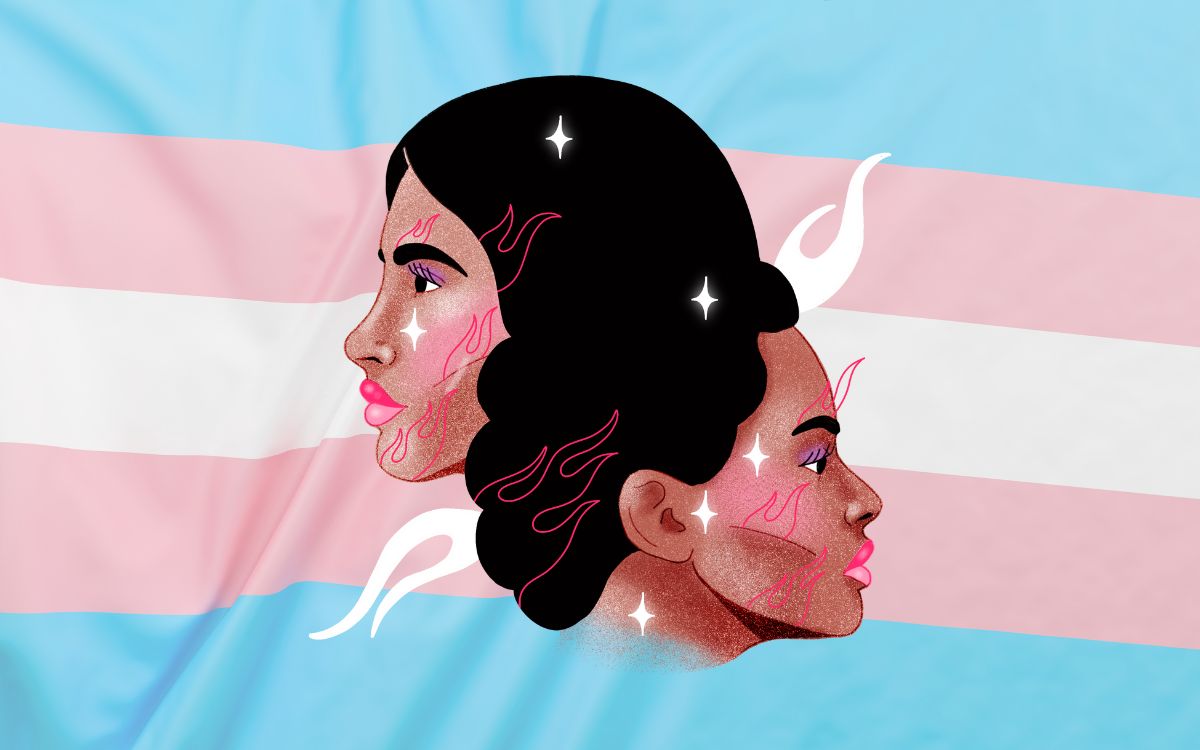
A lot happened at last weekend’s high school state track and field championship meet in
Clovis, Calif. Parents of cisgender student-athletes booed the one and only transgender
girl competing. Police and security officers showed up in large numbers to keep
protestors apart and safeguard the competitors. Police made an arrest outside the
stadium after a demonstrator brandishing a transgender pride flag allegedly assaulted a
man described as a conservative activist and caused damage to his vehicle.
The trans student — 16-year-old AB Hernandez — finished a winner. But she wasn’t “the” winner.
As CBS News reported, “Hernandez took home first place medals in both high jump and
triple jump and she placed second in the long jump event. Following a rule change by
the California Interscholastic Federation, a co-winner was named in each of the three
events in which Hernandez placed.”
You didn’t misread that. Hernandez shared the podium with “co-winners.”
As the Blade reported last week, the CIF introduced a new “pilot entry process” that for
the first time, allowed judges to score trans athletes separately from cisgender
competitors, so there were three winners in every event: a cisgender male winner, a
cisgender female winner and a trans student-athlete winner.
The new policy was announced hours after President Donald Trump threatened to pull
“large scale federal funding” from the state if officials allowed trans athletes to compete
according to their gender identity.
Despite the policy change, the U.S. Department of Justice announced on social
media it was investigating State Attorney General Rob Bonta, State Superintendent of
Public Instruction Tony Thurmond, the Jurupa Unified School District, and the CIF for
potential violations of Title IX, as the Blade reported.
So what happens now? As KXTV reported, President Trump issued another threat to
pull funding on Monday in a post to his Truth Social account, not naming Hernandez but
labeling her “a biological male” and using his favorite derogatory nickname for
California’s Democratic Gov. Gavin Newsom.
“A Biological Male competed in California Girls State Finals, WINNING BIG, despite the
fact that they were warned by me not to do so. As Governor Gavin Newscum fully
understands, large scale fines will be imposed!!!”
Now, the pundits are weighing-in. Sara Pequeño wrote in USA Today how she was
encouraged to see Hernandez share the 2nd place podium with Brooke White and “put
their arms around each other.”
“They’re setting an example for how all of us should treat our trans neighbors, i.e.,
treating them like human beings, not enemies,” she wrote.
As Pequeño noted, Save Women’s Sports, an anti-trans advocacy group, could only
identify five trans students in the entire United States who were competing on girls’
teams from kindergarten through grade 12 in 2023. “That group’s entire existence is to
hate trans athletes, and they found very little to hate,” she wrote.
According to the president of the NCAA, there are fewer than 10 student-athletes
who publicly identify as transgender out of the more than 500,000 competing at the
collegiate level.
Pequeño was not alone in finding joy in the rules change that brought cisgender and
transgender girls together on a podium, each of them a “co-winner.” So did self-
proclaimed “trans advocate” Cyd Zeigler.
He’s one of the co-founders of the LGBTQ+ sports site Outsports, who in 2023
infamously came close to endorsing Florida Republican Gov. Ron DeSantis for
president, only to offer his regrets, following a backlash from readers. Zeigler penned an
op-ed Wednesday originally titled “California trans athlete policy is something everyone
can embrace.”
“Everyone?” Not this sports editor.
He called the new CIF policy “the best possible path in 2025 to trans participation in
sports.”
In celebrating this change, Zeigler also trashed “goal-post-moving trans advocates” and
policies in California and Connecticut that allow “a trans girl to run in boys track meets
and, without a medical transition, later compete in girls meets,” meaning high school
competitions. “That’s bad policy,” declared Zeigler without evidence.
That policy in Connecticut has stood since 2011 and is enshrined in state law, and so far
has withstood legal challenges once again being heard in federal court.
Outsports at some point changed the headline of his screed to “New California trans
athlete policy is something we can embrace” and apparently made another significant
choice: Despite quoting the outlet’s one and only remaining transgender contributor,
Karleigh Webb, who opposes the rules change, Zeigler did not mention her by name.
Why?
In an article published before the championship, Webb wrote: “If AB Hernandez wins,
why should she have to share the spoils with someone else if’s not a tie? That’s what
professional transphobes like Jennifer Sey and Riley Gaines try to sell. Awarding a
duplicate medal gives their nonsense credence to the detriment of the sport and the
athletes.”
Webb is right. Zeigler and the CIF and Gov. Newsom are wrong. You either win, or you
lose, or if you prefer, you come in second, third, whatever. But “co-winners?”
That’s a crock.
Imagine if the Dodgers and Yankees shared the World Series trophy. Why shouldn’t the
49ers also win the Super Bowl alongside the Chiefs? Maybe Kamala Harris should be
declared a “co-winner” of last November’s election?
Personally, I’m glad to see Hernandez embraced by her cisgender peers. I’m relieved to
know that crowds cheering these amazing girls last weekend drowned out the hecklers
who showed up to boo a child. I’m encouraged that even if she had to share the win,
Hernandez was given her rightful place among the teens competing and proved she
was not only worthy of competing but did not win in every event.
So, she’s hardly “unbeatable.” Most trans athletes actually lose, as Zeigler wrote almost
six years ago, back before he started echoing anti-trans inclusion activists Martina Navratilova, Renee Richards and Nancy Hogshead-Makar.
If he really thinks the CIF “co-winners” rule is going to silence anti-trans forces, I think
he’s going to be very surprised by Riley Gaines and her crowd.
While it’s easy for Zeigler to concede public opinion has shifted, he should know
better than to blame those who pushed for inclusion, when it’s clear that conservative
voices in media and politicians, like his, are the ones responsible for influencing that
move to reject trans women’s right to compete in women’s sports. It’s a pendulum swing
that in time will undoubtedly swing back, once the science proves that trans women and
girls don’t always win. In fact, researchers have already proven some trans athletes are
at a disadvantage compared to their cisgender competitors.
Just as Parker Molloy reported that a Republican-commissioned study on gender
affirming care in Utah actually found “that youth who received care before age 18 had
better outcomes, especially around depression, anxiety and suicidality. Hormonal
treatments were associated with positive mental health and psychosocial functioning
outcomes.”
I believe the science is on the side of transgender Americans. Americans love a
winner. Not a “co-winner.”
Opinions
Trump’s inhumanity won’t erase Andry Hernandez Romero, if we resist
Andry Hernández Romero’s case continues to be a violent reminder that we must rise up and resist
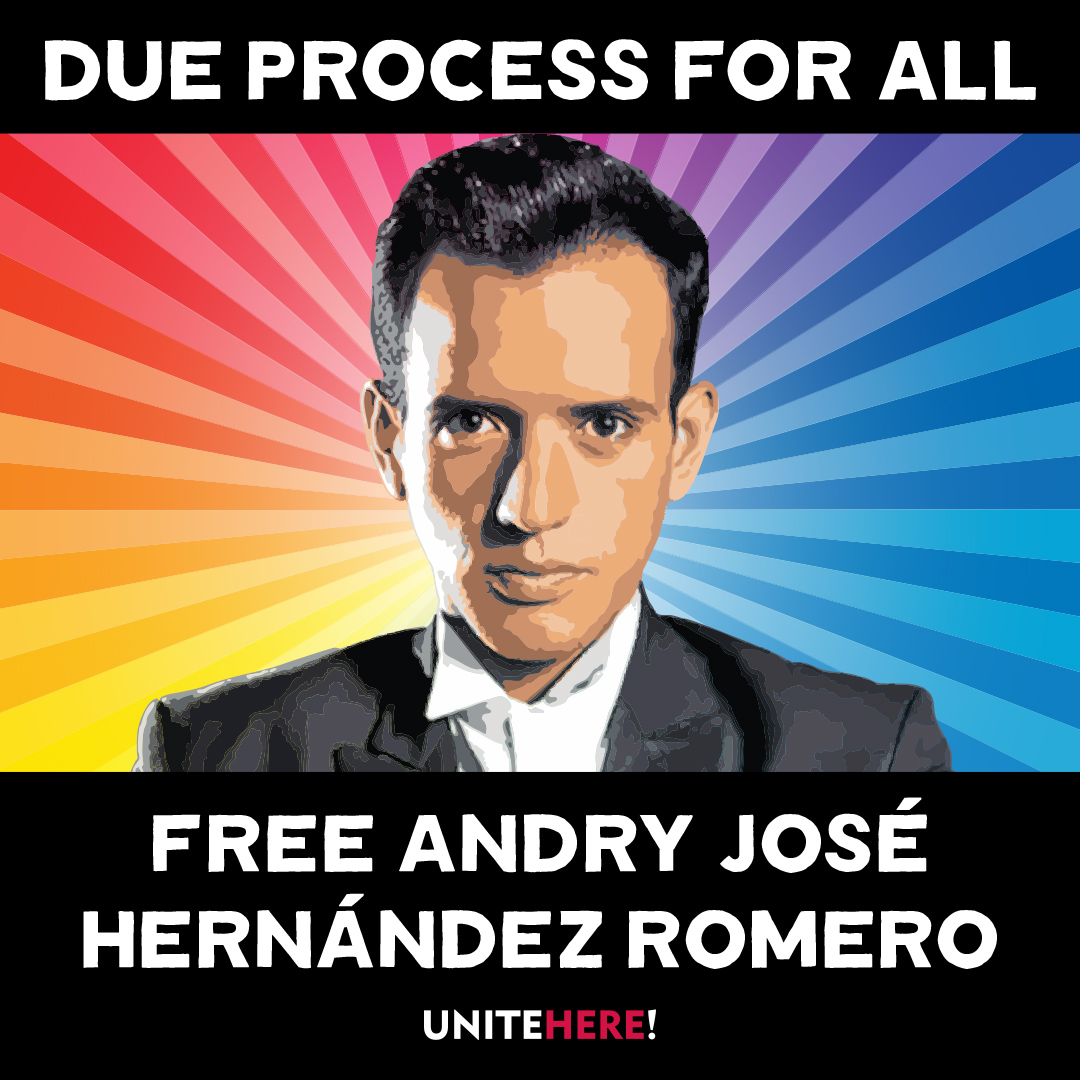
Editor’s Note: Since this article was first published, more information on Andry’s case has become available.
UPDATE: On June 4, a federal judge ruled in favor of the ACLU and Democracy Forward in J.G.G. v. Trump, in which deported gay stylist Andry José Hernández Romero is one of the lead plaintiffs. Describing the Venezuelan deportees’ situation as Kafkaesque, Judge James E. Boasberg said the plaintiffs would likely prevail in their complaint about being denied due process, the New York Times reported. Trump officials, Boasberg wrote in his 69-page ruling, “spirited away planeloads of people before any such challenge could be made. And now, significant evidence has come to light indicating that many of those currently entombed in CECOT have no connection to the gang and thus languish in a foreign prison on flimsy, even frivolous, accusations.”
“Absent this relief,” the judge wrote, “the government could snatch anyone off the street, turn him over to a foreign country and then effectively foreclose any corrective course of action.” He ordered the Trump administration to give the deportees the due process they have been denied.
On Friday, June 6, Rep. Pramila Jayapal (WA-07), Ranking Member of the Immigration Integrity, Security, and Enforcement Subcommittee, will host a shadow hearing Kidnapped and Disappeared: Trump’s Lawless Third Country Disappearances at which Andry’s attorney Lindsay Toczylowski will testify.
The juxtaposition is morally excruciating. The very air in West Hollywood is electric with
queer joy and the excitement of WeHo Pride, but it’s more than a celebration of our ongoing
movement for liberation and equality. We’ve been waiting for a moment to exhale and
stop the clamor of the Trump horror show.
What can we do to stop this overwhelming dictatorship campaign that is gleefully
enforcing Project 2025 through a deluge of cruel Executive Orders, demonizing and
erasing anything under Diversity, Equity and Inclusion initiatives and LGBTQ while dispatching masked ICE agents to snatch anyone Trump’s White Supremacist terrorist administration tags for deportation.
Among those swept up in Trump’s frenetic crusade is Andry Hernandez Romero, a 32-
year-old gay hair stylist and makeup artist who fled harassment and threats of violence in Venezuela in May 2024, after speaking out against authoritarian dictator Nicolás Maduro. After navigating the complex app designed to streamline the byzantine U.S. lawful entry process, last August Romero faced a U.S. border official in San Diego. With no criminal history, he demonstrated a “credible fear of persecution” to proceed with an asylum case.
Imagine what Romero felt — so close to freedom, to opportunity, to unabashed queer joy.
Then came that Trumpian twist.
During a physical exam, officials fixated on Romero tattoos of crowns with the words “Mom” and “Dad.” The agent apparently assumed that Venezuelan gangs accept gays because he suspected Andry had gang affiliations and does not fact check because Tren de Aragua does not use crown tattoos for gang identification.
Romero landed in detention awaiting his asylum court date. But one week before the
March 13 hearing in San Diego, Romero was abruptly transferred to a facility in South
Texas, resulting in his absence in court. The hearing was postponed to March 17 when
the immigration judge again asked where Romero was.
“He was removed to El Salvador….we just found out today,” the ICE lawyer replied. The judge questioned the legality of Romero’s deportation without a removal order.
On March 14, Trump invoked the Alien Enemies Act — a 1798 law used during a
declared war — to target immigrants as government “enemies” who had “infiltrated”
America. Secretly, ICE deported Romero and 137 other Venezuelans to El Salvador’s
notorious Terrorism Confinement Center, with Trump paying dictator President Nayib
Bukele to incarcerate the kidnapped immigrants.
The world watched as Andry and his shackled fellow prisoners were displayed on TV
brutally forced off the plane and forced to kneel as agents roughly shaved their heads.
TIME Magazine photographer Philip Holsinger reported that Romero was being slapped while crying out for his mother, “I’m not a gang member. I’m gay. I’m a stylist.”
Trump called the Venezuelans “rapists,” “savages,” “monsters” and “the worst of the
worst,” claiming they were thoroughly vetted. But ProPublica reviewed each case of the
Venezuelan deportees and reported that the Trump administration knew that “the vast
majority” of the 238 Venezuelan immigrants ”had not been convicted of crimes in the
United States before it labeled them as terrorists and deported them, according to U.S.
Department of Homeland Security data that has not been previously reported.”
Lee Gelernt, the American Civil Liberties Union’s lead attorney fighting the deportations,
told ProPublica that the removals amounted to a “’blatant violation of the most
fundamental due process principles” and subjected the deportees to life imprisonment.
There have been numerous attempts to look for a humanitarian bone in the Trump
administration’s body politic, most notably gay immigrant Rep. Robert Garcia’s heated
exchange with Homeland Security Secretary Kristi Noem during a May 14 congressional hearing. Garcia (D-Long Beach) went to El Salvador for a welfare check
but was denied access to Romero.
“He has had no access to lawyers or family since he has been taken over a month now,”
Garcia told Noem. “His mother just wants to know if he is alive.”
“I don’t know the specifics of this individual case. This individual is in El Salvador and
the appeal would be best made to the president and to the government of El Salvador
on this,” replied Noem.
Garcia pushed back.
“You and the president have the ability to check if Andry is alive and is
not being harmed. Would you commit to at least asking El Salvador if he is alive?”
Nope.
“This is a question that’s best asked to the president and government of El
Salvador,” she said.
Noem’s callous disregard for life and suffering is unsurprising. The former governor of
South Dakota blithely noted in her political memoir that she shot and killed her 14-
month-old dog Cricket when the puppy misbehaved. “I hated that dog,” Noem wrote.
She also shot a goat she didn’t like.
“In neither case did Noem show any doubt or remorse; quite the contrary, she sought to
cast her action as a signifier of tough-minded realism that would burnish her appeal as a
politician from a rural community,” wrote Sara Amundson, president of the Humane
Society Legislative Fund.
So if Noem thinks callousness is cool, imagine how she feels about someone she might
deem as sensetive?
“Under the Constitution, every single person has a right to due process, and that means
they have a right to notification of any allegations the government is making against
them and a right to go into court and prove that those allegations are wrong if that’s the
case,” Lindsay Toczylowski, President of the Los Angeles-based Immigrant Defenders
Law Center who is representing Romero pro bono, told NBC News San Diego April 11.
“In Andry’s case, the government never gave us that opportunity. In fact, they didn’t even
bring him to court, and they have forcefully sent him to El Salvador without ever giving
us any notice or without telling us the way that we could appeal their decision.”
On May 27, Immigration Judge Paula Dixon granted a U.S. Dept of Homeland Security motion to dismiss asylum proceedings for Romero scheduled for the following day.
“We should all be incredibly alarmed at what has happened in Andry’s case. The idea
that the government can disappear you because of your tattoos, and never even
give you a day in court, should send a chill down the spine of every American. If this can
happen to Andry, it can happen to any one of us,” said Toczylowski.
Andry’s life depends on us holding the Trump administration accountable for what they
have done to him,” Toczylowski said. “We will continue to fight until Andry is safe and
free.”
Romero is a lead plaintiff in the American Civil Liberties Union’s and Democracy Forward’s J.G.G. v. Trump case in which Romero’s friend and mother gave statements that are now evidence saying Romero “was persecuted both for his sexual orientation and for his refusal to promote government propaganda” while working as a makeup artist at the TV network in Caracas, according to CNN.
But Project 2025 booster Kevin D. Roberts doesn’t care, having ordered the Trump
administration to delete “the terms sexual orientation and gender identity….out of every
federal rule, agency regulation, contract, grant, regulation, and piece of legislation that
exists.”
So do Trumpland judges care about the raison d’etre for asylum or is that too DEI?
NBC News reported that Romero’s dismissal order “allowed for the possibility that the
case be reopened if Hernandez returns to the U.S.”
That’s why we the people, must rise up and resist.
“As the son and grandson of Japanese Americans who were rounded up and forced into
camps without due process, I know all too well that Andry is not the first person to be
unjustly taken by the government,” says out Rep. Mark Takano (CA-39), Chair of the Congressional Equality Caucus. “Every American should be alarmed by how openly the
Trump Administration is taking people off the street and locking them away in a foreign
prison without so much as a day in court — all because of their tattoos. This fight is not
over yet, but every day it drags on puts Andry and others’ lives in danger. I stand with
Andry, his family, his lawyers, and our Constitution in rebuking President Trump’s cruel
and illegal attacks, and hope that justice is swiftly served.”
Longtime activist Cleve Jones urges all LGBTQ people and allies to take action.
“We don’t know if he’s dead or alive,” Cleve says. “I look at [Romero] and he’s like my little
gay brother who is now in this terrible situation where he — if he is still alive — is probably
being subjected to horrendous brutality on a daily basis.”
But Cleve is also angry at the lack of response to this urgently important case.
“If you want to be intersectional and not just quack about it, look at this case,” Cleve
says. “This young man stands at the intersection of our fight for LGBT equality, for
immigrant rights, and for due process under law.”
San Francisco Pride and New York City Pride rejected his request to name Andry an
honorary Grand Marshal. But, Cleve says, “I’m happy that a number of pride
celebrations have done that. Others have stepped up and are organizing fundraisers. I
see there’s one coming up in New York. But everybody should be talking about Andre.
Free Andre. Free Andre. It’s so important!”
Please note: To support Romero’s case and others like it, the Immigrant Defenders Law Center is selling a T-shirt that says “Asylum is a Human Right, found here.“
Commentary
On Pope Francis, Opus Dei and ongoing religious intolerance

“Good Friday” set the stage for Saturday’s anti-Trump/MAGA “Hands Off” protests serving as a timely lead-in to binge-watching Alex Gibney’s two-part HBO political documentary, “The Dark Money Game” on Easter Sunday. In “Wealth of the Wicked,” nefarious Opus Dei —Svengali Leonard Leo strategically seduces politically disappointed Catholic Federalist Society billionaires into subsidizing a scheme to ‘pipeline’ malleable conservative judges to take over the Supreme Court and overturn reproductive rights.
A key victory for “Operation Higher Court” came in 2010 when SCOTUS ruled 5-4 in Citizens United v Federal Election Commission, that corporations and unions have the same First Amendment free political speech rights as individuals—as long as their unlimited cash donations go to 501 c(4)’s or Super PAC slush funds and not directly to candidates. Twelve years later, in 2022, they got their payoff with the overturning of Roe v Wade by Leo-promoted Catholic justices.
But Leo’s political conniving is not the only exploitation of moral corruption. The documentary exposes conservative Christians too.
Gibney’s anti-hero is a former rabid anti-abortion lobbyist named Rev. Robert Schenck. He tells of turning to a fellow conservative in Cleveland, Ohio after Trump won the Republican presidential nomination in 2016 and asking: “Are we really going to do this? We’re going to choose this man who’s inimical to everything we believe?” The other evangelical replied: “I don’t care how bad he is. He’s going to get us the court we need.’”
Schenck explains the unholy alliance between Christian conservatives and Big Business. “Whenever you talked about government regulation, the argument was eventually —‘these same characters who control my business are going to start trying to control your church. So, it’s in your best interests that we defang this monster’— and that brought a lot of religious conservatives over.”
And there’s this: “We have a little aphorism built on a Bible verse: ‘The wealth of the wicked is laid up for the righteous.’ So, yeah, let’s baptize the billionaires’ money. We can do that — and it eventually brought together this alliance.”
Schenck later reveals an intense epiphany that resulted in regret for how much harm he caused. Not so for Leo.
This is an excerpt from Gareth Gore’s comprehensive book Opus, for Rolling Stone Magazine:
“DURING THE DONALD TRUMP YEARS, conservatives — led by Leonard Leo — took control of the Supreme Court…. At one Federalist Society event, his good friend Supreme Court Justice Clarence Thomas jokingly referred to Leo as the third most powerful man in the world, presumably behind the pope and the president of the United States.”
On Monday morning, Pope Francis died. I liked this pope, compared to the others. I covered Creating Change during the AIDS crisis when author Paul Monette delivered his brilliant, scathing denouncement of the Catholic Church, then unexpectedly ripped up a portrait of Pope John Paul II. Pope Benedict XVI was just crotchety cruel. But Pope Francis —named for St. Francis of Assisi —had that big smile and genuinely seemed to care about migrants, the vulnerable and the marginalized — like us. He even used the word ‘gay’ instead of ‘homosexual.’
Pope Francis’ reply to a question about a Vatican “gay lobby” on a flight from Rio de Janeiro to Rome made global news. “If a person is gay and seeks God and has good will,” he said in 2013. “Who am I to judge? We shouldn’t marginalize people for this. They must be integrated into society.”
What did this mean? Welcoming inclusion into a family that officially considers us ‘intrinsically disordered?’
And then there was Pope Francis’ interaction with Juan Carlos Cruz — a whistleblower in Chile’s clerical sex abuse scandal.
“He said, ‘Look Juan Carlos, the pope loves you this way. God made you like this and he loves you,'” Cruz told The Associated Press.
Meanwhile the Catholic Church Catechism affirmed, “this inclination, which is objectively disordered, constitutes for most of them a trial.”
Ergo, a behavioral choice.
Therein lies the problem.
LGBTQ people are seen largely as individuals with sinful same sex sexual ‘inclinations.’ So when the pontiff touted ‘the equal dignity of every human being,’ and rebuked Vice President JD Vance with the ‘Good Samaritan’ parable, whereby love “builds a fraternity open to all, without exception” — we are still the exception.
Francis was all also human — having to apologize at one point for using a gay slur. But what of the bigger things like, did he know about the Opus Dei takeover of the U.S. Supreme Court when he chastised Vance about deporting migrants? Did he know that the Archdiocese of Los Angeles agreed to pay $880 million to 1,353 people last October, who allege they were victims of clergy sexual abuse? With a previous payment of $740 million, the total settlement payout will be more than $1.5 billion dollars. Is Leo chipping in to replenish that?
And it’s not over. Earlier this month, Downey Catholic priest Jaime Arriaga, 41, was charged with several counts of child sexual abuse which allegedly happened when he was serving as a transitional deacon at the Our Lady of Perpetual Help Church.
Longtime U.K LGBTQ+ activist Peter Tatchell — who’s campaigned against Catholic homophobia for 58 years — says Pope Francis’ legacy is complicated.
“I extend my condolences to Catholics worldwide on the passing of Pope Francis. While we often disagreed on issues of LGBTQ rights, I acknowledge his more compassionate tone towards sexual minorities. His recent moves to allow blessings for same-sex couples, albeit with limitations, signaled a small but significant shift in Church doctrine,” Tatchell said in a statement.
“However, for millions of LGBT+ people globally, the Catholic Church remains a force for discrimination and suffering. Under his leadership, the Vatican continued to oppose same-sex marriage and trans rights. Catholic bishops lobbied against the decriminalization of homosexuality in many parts of the world. The Vatican still upholds the homophobic edicts of the Catechism, which denounces the sexual expression of same-sex love as a ‘grave depravity’ and ‘intrinsically disordered.’ Francis’s legacy is, therefore, a mixed one — offering some progress, but leaving deep-rooted inequalities largely intact.
“The struggle for LGBT+ equality against a homophobic Church must continue. We urge the next Pope to go further—to end the Church’s support for discrimination, both within the faith and in the wider society.”
-

 Commentary4 days ago
Commentary4 days agoThe Supreme Court’s ‘Don’t Read Gay’ ruling
-

 Arts & Entertainment3 days ago
Arts & Entertainment3 days ago2025 Emmy nominations: ‘Hacks’ and ‘The Last of Us’ bring queer excellence to the table
-

 a&e features4 days ago
a&e features4 days agoThe art of controlled chaos: Patrick Bristow brings the Puppets to life
-

 News2 days ago
News2 days agoWest Hollywood to advance protections for diverse and non-nuclear families
-

 Movies3 days ago
Movies3 days ago‘Superman’ is here to to save us, despite MAGA backlash
-

 Sports3 days ago
Sports3 days agoHololive and Dodgers create a home for queer fandom
-

 Events2 days ago
Events2 days agoLos Angeles Blade to take special part in NLGJA Los Angeles inaugural journalism awards





